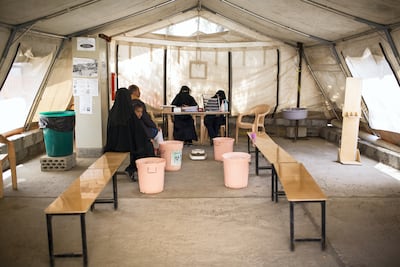Four men accused of kidnapping two aid workers from the Doctors Without Borders (MSF) group last year have been sentenced to death by a court in Yemen’s eastern Hadhramaut province.
The Criminal Court of First Instance specialising in terrorism and state security cases convicted Mohammed Ali Al Harthi, Ali Ghaleb Al Shaafa Al Salhi, Abdulrahman Ali Al Salhi and Shihab Abdullah Al Salhi and ruled they should be either be beheaded or shot.
The court also convicted Mohammed Saleh Tareq of using a forged document and sentenced him to serve time under pretrial detention.
The court acquitted five other defendants in the same case.
In March 2022, two MSF employees were kidnapped in the south-east of the country, and released a few months later.
The convicts intercepted a car carrying two foreign MSF workers while they were travelling on the road linking the Al Abr and Al Khasha’a districts west of Hadhramaut province in eastern Yemen, and took them to an unknown location.
Yemeni security forces freed the two aid workers, six months after their capture, and arrested several members of the group that carried out the kidnapping.
Al Qaeda in the Arabian Peninsula (AQAP), considered by the US to be the most dangerous branch of the network, freed five UN workers in early August.
They had been held for a year and a half as they returned to the southern port city of Aden.
International organisations and their staff have been periodically victimised by armed groups that have proliferated as a result of the country’s nine-year civil war.

Earlier in August, MSF said it had “lost contact” with two of its foreign staff in Yemen, the group told AFP.
The employees, a German and a Burmese, had been in the northern province of Marib, the aid group said at the time, without giving details.
After the Iranian-backed Houthi rebel group seized the Yemeni capital Sanaa from the internationally recognised government in 2014, Saudi Arabia mobilised a military coalition the following year to stop the rebel advance.
The fighting calmed markedly after a UN-brokered ceasefire that came into effect in April 2022 and largely held even after the agreement lapsed last October.
More recently, the ceasefire seemed to have been shaken after four Bahraini servicemen died late last month following a Houthi drone attack near the Yemeni-Saudi border.
Observers fear the latest attack could jeopardise talks between Saudi and Houthi officials who have just held another round of negotiations on a potential agreement towards ending the conflict.


